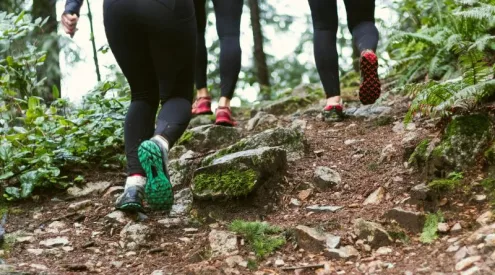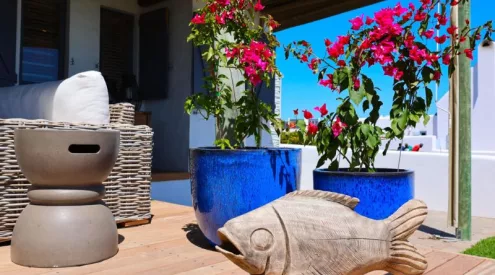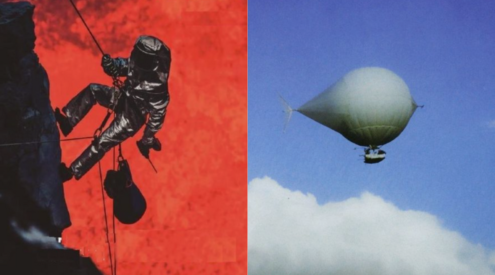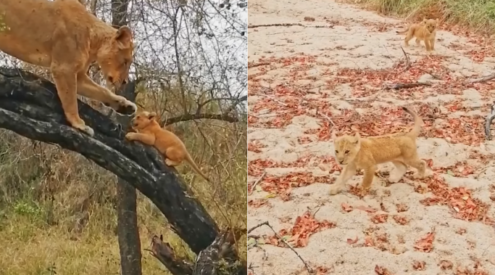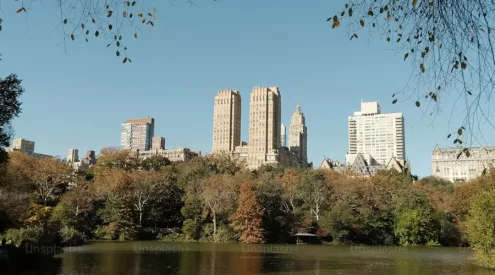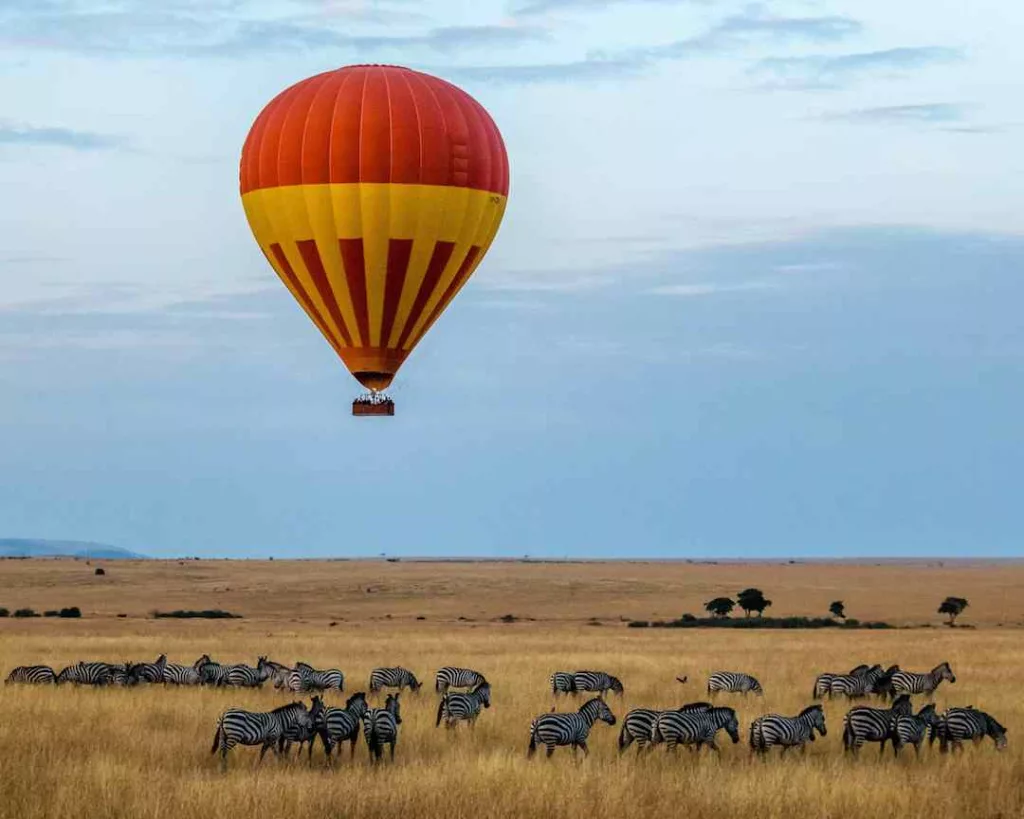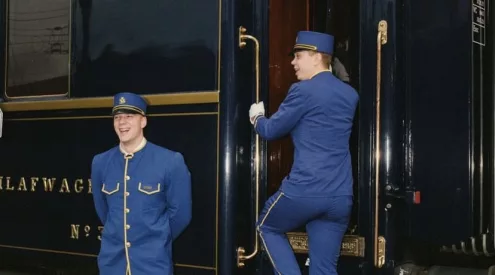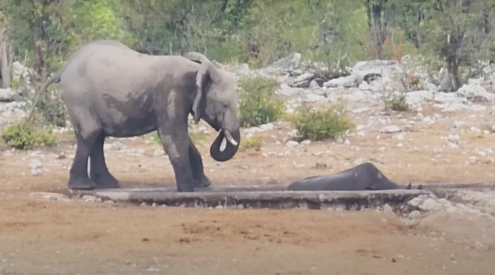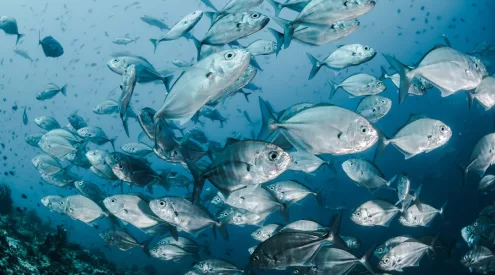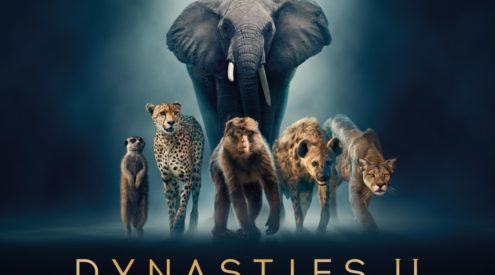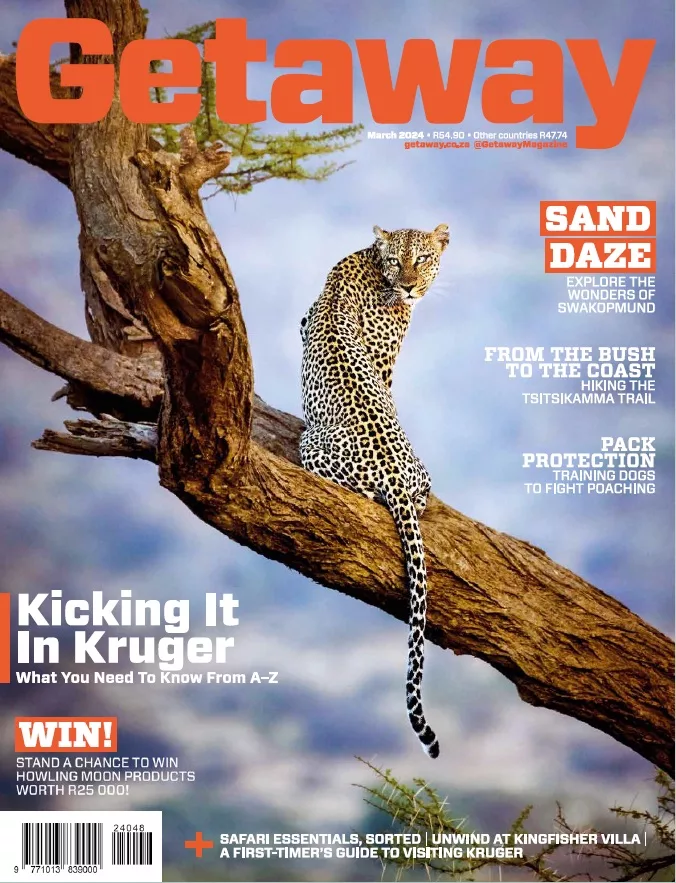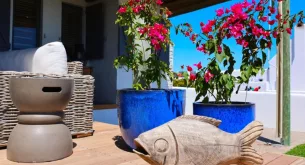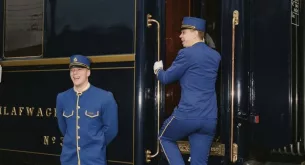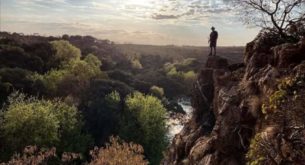‘Basil is scared of his father,’ the camp ground attendant at Mukambi Safari Lodge on the banks of the Kafue River in Zambia explained.
‘Really?’ I asked. Basil had been touted as one of the main attractions at Mukambi, located near the central entry point to Kafue National Park. It was said the lodge had a resident hippo who slept in the bar during the day time. I asked where Basil was.
‘Yes. He slept in the (staff) compound last night because his father wanted to kill him.’
Instead of foraging for food at night the terrified Basil had taken refuge and had slipped away early in the morning to get a bit to eat, hopefully out of reach of his father, who recently kicked him out of the pod.
It seemed to me that a hippo who spent most of the day in a bar, with humans, instead of in the water with his own kind was probably already hippopotamus non grata with the rest of his pod, but it seemed Basil’s father didn’t want him in the same country, let alone the same territory.
Taking our lead from Basil we left the very well appointed camp ground and headed for the bar and pool. Both were excellent. In fact, everything about Mukambi was very agreeable, right from the moment we stepped in and were given a full briefing on facilities and safety by the manager on duty, Victor.
‘I must run a few things past you, so we are all talking off the same page,’ Victor said.
‘Fine,’ I replied. ‘Run them up the flagpole and we’ll see if we’ll salute them.’
‘Good,’ said Victor. ‘There was a lion in the camp site last night and three leopards in the manager’s garden, so be careful where you walk.’
‘OK. And Basil?’
‘He should be in the bar this afternoon.’
There were pictures of Basil in the lounge but I was beginning to doubt he was still around. Perhaps his father had actually finished him off. I asked the waitress who brought me yet another cold Mosi Lager if she could let me know when Basil arrived.
‘Of course.’
Just after lunch she came to the pool. ‘Basil has arrived.’
And so he had, all several hundred kilograms of him. Not the biggest hippo I’d ever seen (he’s still a young male), but definitely the closest. He moved ponderously, giving a great deal of thought to every step, into the bar, selected a cool shady spot and gently lowered himself down. As he did so the staff arranged a corral of barstools and tables around him and beckoned us and several other guests closer.
Basil had entered the building and he was there to stay – all afternoon in fact, even when we set off on our boat cruise.
Look, I like river cruising in Africa, but I never really hold out high hopes for game viewing. About the best I’d seen was a cranky elephant a few years ago who trumpeted and flapped his ears. He was up on the banks of the Zambezi and it was novel (and a little scary) looking up at an animal instead of down or at it directly from a vehicle. But I wasn’t expecting much more than a few birds, the odd croc, and perhaps Basil’s angry father.
And so it went. We saw some nice kingfishers (my favourite type of bird) – malachite, pied and giant – and some plovers, or lapwings, or whatever they’re called now making a racket.
‘They must be trying to scare something off,’ said our guide.
And so they were. As we approached a young croc slid into the water and we thought that was that until the farmer’s wife next to me (late of South Africa and more recently farming in Zambia where the country’s commercial farming sector has taken off in recent years), called out; ‘Leopard!’
The birds had good cause for concern because there, sure enough, was a big male leopard sneaking through the grass atop a high bank, making for the water.
I love leopards because they always look guilty. Mrs P and I call them ‘sneaky cats’ because they’re always sneaking around and they always look like they’ve just done something rather naughty and they’re a little peed off that you’ve caught them in the act.
He stared at us as we took his picture, repeatedly, then backed away. It was one of the best leopard sightings I’d ever had, and it was over in an instant.
I was pleasantly surprised, as I had been during our travels in the south of Kafue National Park, at the quality of the sighting I’d just had. People had told me I’d see nothing but tsetse flies in Kafue (and there were plenty of those), but here this lovely, quiet, out of the way place was surprising me yet again.
At the end of the cruise we hung around the bar for a short while saying goodbye to the farmer’s wife and the farmer, but we left for the campsite just a little too early. When we returned for dinner (which turned out to be exceptional), we heard we’d just missed Basil’s father, who came splashing out of the water, thundering up the stairs and crashing through the bar furniture in pursuit of a his human-loving son.
Just when Basil had thought it was safe to go back into the water his dad had found him. Basil senior chased him out the back and into the garden. We hoped he hadn’t caught him.
The next day we left Mukambi and drove north through the game management area that borders Kafue to the east, crossed the main road to Lusaka, and headed north into the park again to McBride’s camp.
McBride’s was the furthest north we could go into the park and still camp. We’d been told that the supposedly game-rich Busanga Plains in the north east had no lodges that allowed camping. It didn’t really matter, though, as we’d done very well for ourselves in the south and centre of the park.
McBride’s is named after resident owner, Chris McBride, a famed lion researcher and conservationist who wrote the bestselling book, The White Lions of the Timbavati, many years ago. He’s still interested in lions.
We arrived late afternoon and Chris told us he would be leaving in five minutes on a drive to check on a lioness that had been spotted earlier in the day. We were invited to join him on the drive. ‘No charge,’ he said, ‘but I’m leaving in five minutes. Don’t be late.’
We hurried back to the campsite, grabbed our cameras and arrived six minutes later. Forgiven our sin, we were still invited to come along (and, for the record, there was a fair bit more to-ing and fro-ing before left).
Unfortunately, we missed the lion. Probably by a minute.
Graciously forgiven, we decided to go with Chris on a walk the next morning. On some walks in the African bush the guide and scouts go out of their way to avoid dangerous game, preferring instead to show you interesting plants and trees, tracks, birds and other generally non lethal stuff.
Chris, however, was going looking for lions, and nothing else. We followed lion tracks, checked lion dung and fur balls, found lion resting places, and, eventually finding no lions, we lay up just as they would in the shade in a dry riverbed (a friend of mine who is a trails guide in Kruger always stays clear of dry river beds as this, he says, is where lions and buffalos sleep).
While we missed the felines we did come across a very friendly and curious warthog by the name of Webster, who trotted close to us, nodded hello to Chris, and paralleled our course for some time. Webster was probably the most relaxed warthog I’ve ever come across, save for the resident gardeners at the Chobe Safari Lodge in Botswana.
There was game all around McBride’s camp – a plethora of puku and an impi of impala. There was a resident elephant ambling around and all of the animals we viewed from the camp seemed particularly relaxed around us humans. Chris told us he and his wife, both deputized as honorary game police officers, regularly arrested poachers. They patrolled their concession and it was clear to me the game knew they were safe from harm around McBride’s.
Except from the lions, of course.
Our friend Claire (the one who, in the last instalment, mistook a lion call for a hippo grunt) had decided to stay in the camp, thinking she would be safe and sound, like the resident impala and puku.
When we returned from our walk an excited attendant came up to Chris as told him he had seen a lioness, about half an hour earlier.
‘Where?’
‘At the campsite, Bwana, walking right past it. Close, close.’

